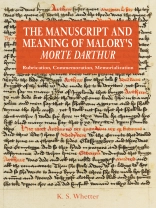An examination of the rubricated letters in the Morte makes a convincing case for the design being by Malory himself.
The red-ink names that decorate the Winchester manuscript of Malory’s
Morte Darthur are striking; yet until now, no-one has asked why the rubrication exists. This book explores the uniqueness and thematic significance of the physical layout of the
Morte in its manuscript context, arguing that the layout suggests, and the correlations between manuscript design and narrative theme confirm, that the striking arrangement is likely to have been the product of authorial design rather than something unusual dreamed up by patron, scribe, reader, or printer.
The introduction offers a thorough account of not only the textual tradition of the
Morte, but also the ways in which scholarship to date has not done enough with the manuscript contexts of Malory’s Arthuriad. The book then goes on to establish the singularity and likely provenance of Winchester’s rubrication of names. In the second half of the study the author elucidates the narrative significance of this rubrication pattern, outlining striking connections between manuscript layout and major narrative events, characters, and themes. He suggests that the manuscript
mise-en-page underscores Malory’s interest in human character and knighthood, creating a memorializing function similar to the many inscribed tombs that dominate the landscape of the
Morte’s narrative pages. Inshort, Winchester’s design creates a memorializing tomb for Arthurian chivalry.
K.S. WHETTER is Professor of English at Acadia University, Canada.
قائمة المحتويات
A Textual Introduction
The Unusual Nature of Winchester’s Rubrication
Tracing Winchester’s Rubrication and Marginalia
Chapter 2, Appendix I: Classifications of Rubrication
Chapter 2, Appendix II: Rubrication Errors or Departures from the Usual Pattern
Malory’s Sacralized Secularity
Rubricated Elegy
Conclusion: The Red and the Black
Bibliography
عن المؤلف
K. S. WHETTER is Professor of English at Acadia University, Nova Scotia.












